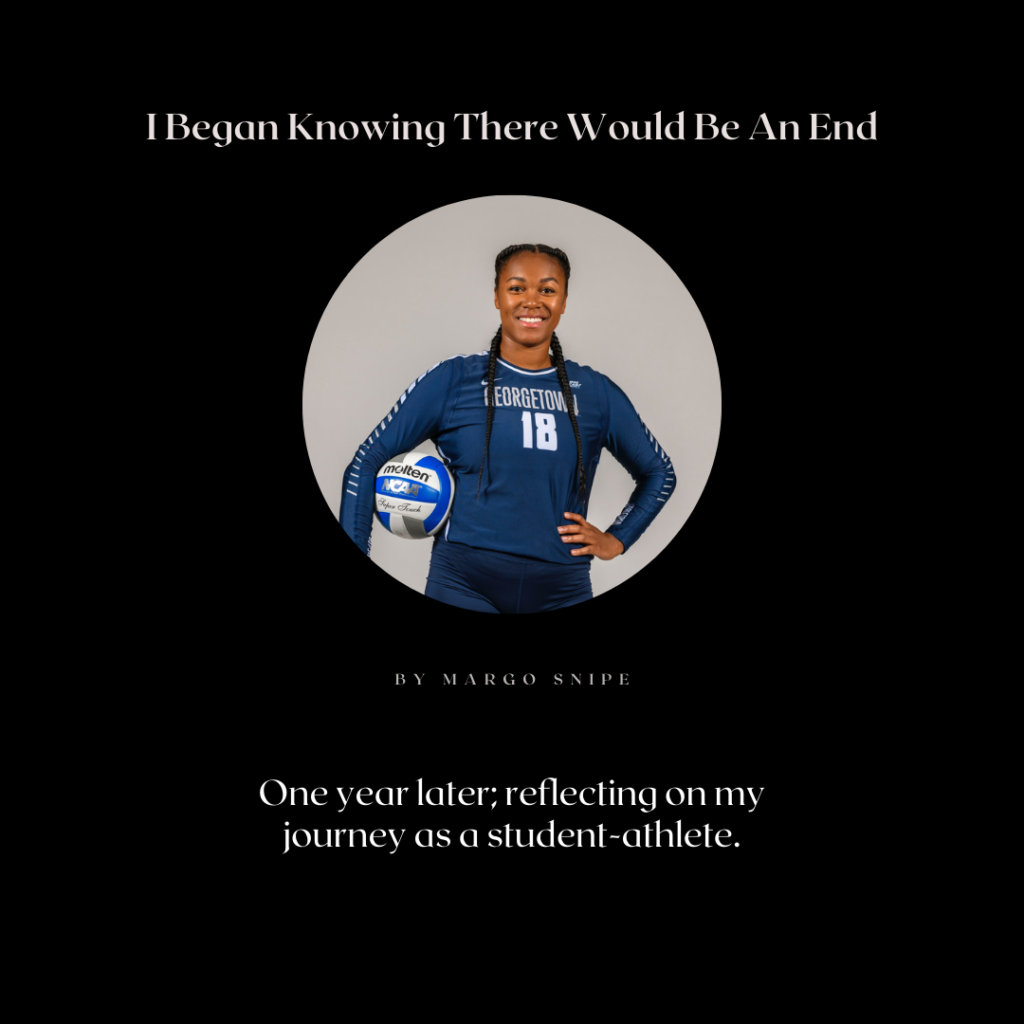I began knowing there would be an end.
I slipped on the navy jersey many times knowing the day would come where I wouldn’t compete in the same way. Knowing I’d miss road trips, game days, locker room concerts with my teammates – a game time tradition that meant dancing and singing until our hearts raced. I’d wish I could go back to the days when nerves crept up as I stood with my hands on my knees, staring at my opponent through the volleyball net, waiting for the whistle to blow before the start of the next play.
For four years competing for Georgetown University, adrenaline tangled in with muscle strains, rolled ankles, love for the women beside me and sweat dripping so hard my elbows couldn’t hold up a plank without slipping out from underneath my shoulders. There was a constant clash between my desire to outperform the athlete I was yesterday and care for myself as a whole person. A student athlete, they called me.
It didn’t take long to realize athletes, particularly Black athletes at predominantly white institutions, are often shoved into boxes.
I refused to wear my volleyball gear for the first few weeks of class, pushing back against the stereotype that sports were my only way into the lectures. Volleyball would be a part of me, not who I was. If I was lucky, my being a collegiate athlete would surprise my peers after the thoughtful debates and simple interactions that established me as Margo, the student. The person.
And I did. I’d go on to juggle internships with weightlifting. Textbooks with five-hour bus rides. Exams with cross-country flights. Friendships with jam packed schedules.
I’d hunt for mentors, network with journalists, and find my voice just enough to advocate for student athletes at my institution and beyond. I’d hope for a handful of hours of sleep and spill coffee as I rushed between classes.
A global pandemic canceled the ultimate celebration of those four – tough, yet remarkable – years, forcing the class of 2020 to bring their college years to a close over a computer screen. Still, it gave us a pause from the grind of personal, professional, and athletic development, and provided perspective on what matters most. Daily competition leaves little room for space to grow as students and young adults. But, left sportless in the throes of Black Lives Matter protests, we were forced to investigate who we are off the court. It became clear race couldn’t be separated from the student athlete experience – a message a small cohort of other Black athletes and I had been conveying for years. Now, others were more willing to listen.
I fell back on my journalism, my friendships and my family. Now a year removed from Division 1 athletics, I miss the grind as much as I imagined I would before I hung up my jersey for the last game. I’m preparing to coach to invest in the next generation of players. My hope is to develop gritty, determined athletes. Women with respect for their physical and mental health, who cherish the competitive years they’ve got and who are able to develop a sense of self beyond their jersey.
Women who begin knowing there will be an end.
About the Author
Margo Snipe graduated cum laude from Georgetown University, where she competed on the varsity women’s volleyball team. In her final year, she served as Georgetown’s Student Athlete Advisory Committee President.
After graduation in 2020, she started her career as a journalist, writing stories that focus on race, disparities and politics. She reports on health equity for the Tampa Bay Times.


Inspiring reflection, Margo!